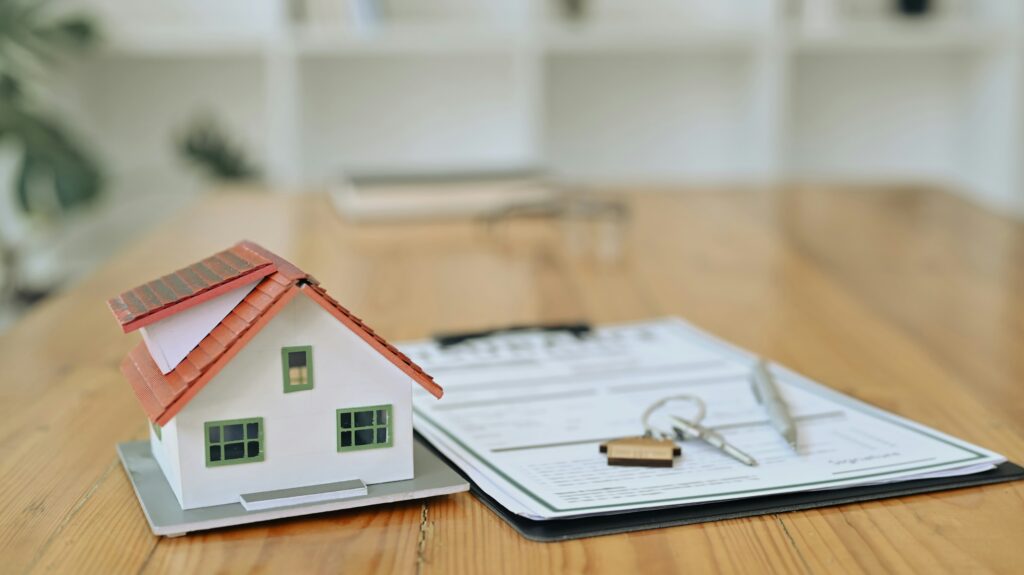
Can You Sell a House with a Mortgage?
If you’re wondering, ‘can you sell a house with a mortgage?’, the answer is yes. You can sell a house with a mortgage in the UK – it’s actually quite common. In fact, most people sell their homes before their mortgages are completely paid off. Whether you want to relocate for work, upgrade to a larger property, downsize in retirement, or simply cash in on rising home prices, having a mortgage will not prevent you from selling.
This guide explains everything you need to know about selling a home with an outstanding mortgage. We’ll go over how the process works, what happens to your mortgage when you sell your house, and what you should consider in terms of timing, fees, and finances.
What Happens to Your Mortgage When You Sell?
When you sell a property with a mortgage, your lender does not expect you to pay it off out of pocket. Instead, the solicitor handling the sale will repay the outstanding balance with the proceeds of the sale.
Here’s how it usually works.
- You accept an offer on your home.
- Your solicitor seeks a redemption statement from your mortgage lender. This shows you exactly how much is left to repay, including any interest and potential early repayment charges (ERCs).
- On the day of completion, the buyer’s solicitor transfers the purchase funds to your solicitor.
- Your solicitor will use those funds to pay off your mortgage in full.
- Any remaining funds, after fees and mortgage repayment, are transferred to you. This is your equity.
It’s a well-established procedure, and your solicitor will handle all communication between the parties to ensure that everything runs smoothly.
Can You Sell a House That’s in Negative Equity?
Yes, but it’s more complicated.
Negative equity indicates that your mortgage balance exceeds the current market value of your home. This could happen if house prices fall or if you bought with a small deposit and haven’t paid off much of it yet.
For example, if your home is worth £180,000 but you owe £200,000 on the mortgage, you have £20,000 in negative equity. Selling in this situation means you’ll still owe your lender money after the transaction, which must be settled.
You have a few choices:
- To cover the shortfall, use savings or other available funds.
- Speak with your lender to see if they will approve a sale and set up a repayment plan for the remaining debt.
- Sell to a professional home buyer, who may be able to help you negotiate with your lender and provide a quick, hassle-free transaction.
Lenders are not required to accept a shortfall, so seek independent financial advice and contact your mortgage provider right away.
Can You Port Your Mortgage to a New Property?
Many mortgage products are portable, which means you can move your current mortgage to a new home if you’re buying and selling at the same time.
Porting your mortgage enables you to:
- Keep your current interest rate
- Avoid early repayment charges
- Streamline the moving process
However, this isn’t automatic. You’ll have to:
- Pass new affordability checks
- Submit a fresh application to your lender
- Ensure that the new property meets your lender’s criteria
If your new home is more expensive, you may need to borrow more money, possibly at a higher interest rate.
On the other hand, if you’re downsizing and the new property is less expensive, you may not require the entire mortgage amount, which can influence your lender’s decision.
If porting is not possible or does not meet your needs, you will need to pay off your current mortgage and obtain a new one for your next home.
What About Early Repayment Charges (ERCs)?
One of the most important things to check before selling is whether your mortgage has early repayment fees. Lenders charge these fees if you pay off your mortgage before the fixed or discount period expires, which is usually within the first 2 to 5 years of your loan.
ERCs are typically calculated as a percentage of your remaining mortgage balance, which can range from 1% to 5%. On a £150,000 mortgage, that could be up to £7,500.
To determine if this applies to you:
- Check your mortgage offer document or key facts illustration
- Speak with your lender directly
- Request a redemption statement for an exact figure
In some cases, it may make sense to postpone your sale until the ERC period is over, especially if the fee is high.
Can You Sell Quickly If You Still Have a Mortgage?
Yes, absolutely, and there are several options depending on how quickly you need to move.
1. Traditional Estate Agency Route
If you don’t need to sell your property right away, you can use an estate agent. This typically takes several months, depending on market conditions and the buyer’s situation. Delays are common when dealing with a property chain.
2. Cash House Buyer
If you need to sell quickly (perhaps due to financial difficulties, divorce, job relocation, or inheritance), a professional cash house buyer can provide a much quicker solution. This option provides you with certainty, speed, and simplicity, which is particularly useful when time is of the essence.
What Documents Do You Need to Sell a Mortgaged Property?
When preparing to sell your home, collect the following documents:
- Mortgage account number
- Recent mortgage statement
- Redemption statement from your lender
- Title deeds or proof of ownership
- Energy Performance Certificate (EPC)
- Property Information Form (TA6)
- Fixtures and Fittings Form (TA10)
Your solicitor or conveyancer will advise if anything else is required during the process.
Can You Sell a Buy-to-Let Property with a Mortgage?
Yes, you can resell a buy-to-let property with an outstanding mortgage. The process is similar, though your lender will usually require that the property be vacant at the time of sale, unless you are selling to another landlord.
Be aware that selling an investment property may result in tax implications, such as Capital Gains Tax (CGT), particularly if the property’s value has increased significantly since you purchased it.
FAQs: Selling a House with a Mortgage
Can I sell a property before my mortgage is paid off?
Yes, this is perfectly normal. Your solicitor will repay your mortgage with the proceeds of the sale.
Can I transfer my mortgage to a new property?
Possibly. If your mortgage is portable, you may be able to transfer it to your new home; however, you must meet your lender’s requirements and go through affordability checks.
What happens if I’m in negative equity?
You will need to obtain your lender’s permission to sell and make arrangements to cover any shortfall. It is advisable to seek financial advice before proceeding.
How are early repayment charges calculated?
Usually as a percentage of the remaining loan balance. The exact fee varies according to your lender and mortgage terms.
Can I sell my house fast even with a mortgage?
Yes. Companies such as Sell House Fast can buy your house for cash and pay off your mortgage right away, often within a few weeks.
If you want a quick, secure sale, whether you have a mortgage, are facing repossession, or need to relocate quickly, Sell House Fast can help. Contact us today for a free, no-obligation quote, and take the next step with confidence.


